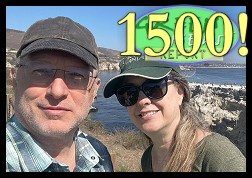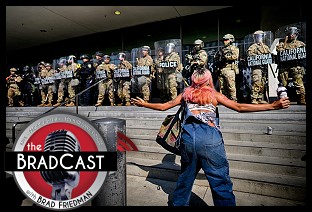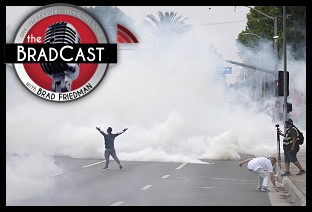*** Special to The BRAD BLOG
*** by Libby/CIA Leak Trial Correspondent Margie Burns
When the full history of bogus WMD propaganda is written, a few individuals and agencies in our government will stand out for having tried to be rational voices during the administration’s juggernaut PR campaign to invade Iraq. Among these is the Bureau of Intelligence and Research (INR) in the State Department.
The whole Niger story, that Iraq tried to buy tons of unenriched uranium, called yellowcake, from the African nation of Niger, displays the chasm between genuine analysts on one side and weird administration war boosters on the other. This story, which birthed the famous 16 words in a State of the Union speech, led to former ambassador Joseph Wilson’s trip to Niger, his subsequent criticisms of the administration, pundit Robert Novak’s outing Wilson’s wife as a CIA operative, at least two investigations into the leak --- with Novak and George W. Bush among those hiring attorneys – and the current trial of Lewis Libby, Vice President’s former Chief of Staff.
The Report on the U.S. Intelligence Community’s Prewar Intelligence Assessments on Iraq is 521 pages online (http://intelligence.senate.gov/iraqreport2.pdf; link down). Part II, on Niger, is pages 36-83. Numbers in parentheses, below, are the pages cited.
“Reporting on a possible yellowcake sales agreement between Niger and Iraq first came to the attention of the U.S. Intelligence Community (IC) on October 15, 2001,” when the CIA Directorate of Operations (DO) passed along a report from a “foreign government service indicating that Niger planned to ship several tons of uranium to Iraq.” At the time, all IC analysts regarded this forwarded cable to be limited and lacking in detail. The CIA, DIA (Defense Intelligence Agency), and Department of Energy (DOE) called it “possible.” The State Department Bureau of Intelligence and Research (INR) regarded it as “highly suspect.” (36) The INR turned out to be right...
From the first, INR believed that Niger, a US trading partner and a US aid recipient, would be reluctant to engage in such a deal with Saddam. The INR also believed that since Nigerian uranium mining was controlled by a French consortium, Niger could not transfer uranium to Iraq. Only the CIA wrote up a finished intelligence report regarding Niger uranium, a Senior Executive Intelligence Brief (“Iraq: Nuclear-Related Procurement Efforts,” October 18, 2001), three days later. The Committee report does not say who saw or read the report, if anyone did.
On November 20, 2001, the French consortium told the US embassy in Niger that there was “no possibility” that any Niger yellowcake had been diverted. “Reporting on the uranium transaction did not surface again until February 5, 2002,” when the CIA issued another report regarding Niger uranium, again citing a “foreign government service” but quoting it in more detail. (37)
Note the time gap here; clearly the CIA itself was dubious about the alleged Iraq-Niger link. While the CIA and DIA were more impressed with this report, the INR still doubted, for continuing reasons, and asked whether the source would be willing to undergo a lie-detector test. If any lie-detector test was given, none is mentioned. This time, the DIA wrote up a finished intelligence report (February 12, 2002), which concluded that “Iraq probably is searching abroad for natural uranium to assist in its nuclear weapons program,” but “did not include any judgments about the credibility of the reporting.” This DIA report went to Vice President Cheney, who asked the CIA for analysis. The CIA briefing for Cheney pointed out that the report on Niger uranium came from one uncorroborated source and that it was contradicted by the US embassy, which noted again that the uranium traffic was controlled by France. (38-39)
No wonder the big push to invade Iraq included so much France-bashing: France was in a unique position to debunk that whole “mushroom cloud” story.
Officials from the CIA Counter-Proliferation Division told the Committee that, in response to Cheney, they looked around for ways to check the information, and selected Joseph Wilson. “The former ambassador had traveled previously to Niger on the CIA’s behalf,” although the CIA had not distributed a report on the previous visit, since it did not uncover information. (39)
For something as urgent as a “mushroom cloud,” we seem not to be talking James Bond here. A few days later, on February 18, 2002, the US embassy in Niger, which had previously reported that no Niger uranium was diverted, now cabled that the report warranted another “hard look” at Niger uranium. However, it also mentioned that the “purported 4,000-ton annual production listed is fully 1,000 tons more than the mining companies claim to have produced in 2001.” Next day, Wilson met with personnel from several agencies to discuss a Niger trip. (40)
The INR continued to express skepticism: it would be hard to hide such a large shipment of uranium, and “the French appear to have control of the uranium mining, milling and transport process, and would appear to have little interest in selling uranium to the Iraqis.” INR also pointed out that anyone involved in a uranium deal would be unlikely to admit it to Wilson, and suggested that the Niger embassy had good contacts and thus the trip was redundant. (40) This point was made again in testimony in the Libby trial by a former CIA manager.
The Report shows that Wilson’s mandate was limited. On February 20, 2002, Wilson was given talking points to use with Nigerian officials, but only general points. “The talking points did not refer to the specific reporting on the alleged Iraq-Niger uranium deal, did not mention names or dates from the reporting, and did not mention that there was any such deal being reported in intelligence channels.” With these limits, Wilson left for Niger the next day. (41)
At about the same time, oddly enough, current officials from Niger including its president were questioned by Four-Star Marine General Carlton W. Fulford, Jr, deputy commander of the US European Command, with talking points “coordinated with” the CIA. This meeting, which overlapped with the Wilson trip, included the US Ambassador to Niger. (41)
On top of the duplication of effort, when Wilson got to Niger, the U.S. ambassador also “asked him not to meet with current Nigerien officials because she believed it might complicate her continuing diplomatic efforts with them on the uranium issue. The former ambassador agreed to restrict his meetings to former officials and the private sector.” However, the ambassador “told Committee staff that during her meetings with Nigerien officials, she never asked whether the officials had been approached by any countries to purchase uranium. She said, We raised the issue in more general terms rather than specifics.” (42)
Since the ambassador’s own talking points were coordinated with the CIA, the CIA must have ruled out pertinent questions. Why? – to prevent any definitive resolution of the yellowcake issue? In any case, the limits on Wilson, including reports of the alleged Iraq-Niger deal specifically, produced predictable results: “IC analysts had a fairly consistent response to the intelligence report based on the former ambassador’s trip in that no one believed it added a great deal of new information to the Iraq-Niger uranium story.” (46) Wilson’s report was then dismissed by the CIA as providing no new information. It is regrettable that the taxpayers paid for this trip. The Committee report strongly suggests that Wilson was actively impeded from turning up useful evidence about Niger, leading to the inference that Niger uranium was never a genuine issue.
Yet somehow a bogus mushroom cloud story was used to bring about an invasion that has killed more than three thousand US troops and hundreds of thousands of helpless Iraqis.
“On March 1, 2002, INR published an intelligence assessment, titled NIGER: SALE OF URANIUM TO IRAQ IS UNLIKELY. (Does this title remind anyone of that Presidential Daily Briefing from August 2001, “Bin Laden determined to strike in U.S.”?) The INR analyst who drafted the assessment told Committee staff that he had been told that the piece was in response to interest from the Vice President’s office in the alleged Iraq-Niger uranium deal.” The key word is “unlikely.” The assessment reiterated that Niger uranium was controlled by France, not Saddam, and that the US was a key aid donor for Niger.
“In early March 2002, the Vice President asked his morning briefer for an update on the Niger uranium issue,” and was told on March 5 that Wilson was going to be debriefed that day. “Later that day, two CIA DO officers debriefed the former ambassador who had returned from Niger the previous day.” (43)
The report on the trip contained no indications that Iraq had attempted to purchase Niger uranium.
Bush-Cheney seem to have been set from the first not only on war with Iraq, but on admitting to inner circles exactly the people they should have excluded (Guckert), and shutting out exactly the people (INR analysts) they should have protected and nurtured. BTW, the Report confirms, as does testimony in the Libby trial, that the Office of the Vice President (OVP) was indeed interested in and asking questions about the Niger story. It nowhere says --- nor did Wilson --- that Wilson was "sent" by the VP. But that falsity is material for another entry. Looks like NBC needs our help, as does the NYTimes.
[This article shortened from a publication in 2005.]


 Sunday 'Total Obliteration' Toons
Sunday 'Total Obliteration' Toons Thank You For Your Attention to This Matter:
Thank You For Your Attention to This Matter: 'Green News Report' 6/26/25
'Green News Report' 6/26/25
 Mamdani Primary 'Win' Augurs New Generation of Progressives Rising: 'BradCast' 6/25/25
Mamdani Primary 'Win' Augurs New Generation of Progressives Rising: 'BradCast' 6/25/25 U.S. Authoritarianism Under-way (But We're Still Here to Fight It): 'BradCast' 6/24/25
U.S. Authoritarianism Under-way (But We're Still Here to Fight It): 'BradCast' 6/24/25 'Green News Report' 6/24/25
'Green News Report' 6/24/25 'Anti-War' Trump Attacks a Mid-East Nation on False Claims About WMD: 'BradCast' 6/23/25
'Anti-War' Trump Attacks a Mid-East Nation on False Claims About WMD: 'BradCast' 6/23/25  Sunday 'Peacemaker' Toons
Sunday 'Peacemaker' Toons Senate Health Care Cuts 'More Extreme' Than House Version: 'BradCast' 6/19/25
Senate Health Care Cuts 'More Extreme' Than House Version: 'BradCast' 6/19/25 'Green News Report' 6/19/25
'Green News Report' 6/19/25 What 'Anti-War President'? MAGA Civil War Over Trump, Iran: 'BradCast' 6/18/25
What 'Anti-War President'? MAGA Civil War Over Trump, Iran: 'BradCast' 6/18/25 Trump Calls for 'Remigration', a Codeword for 'Ethnic Cleansing': 'BradCast' 6/17/25
Trump Calls for 'Remigration', a Codeword for 'Ethnic Cleansing': 'BradCast' 6/17/25 'Green News Report' 6/17/25
'Green News Report' 6/17/25 Last Weekend Today: 'BradCast' 6/16/25
Last Weekend Today: 'BradCast' 6/16/25 Sunday 'Despot Times, Despot Measures' Toons
Sunday 'Despot Times, Despot Measures' Toons Then They Came for the U.S. Senators: 'BradCast' 6/12/25
Then They Came for the U.S. Senators: 'BradCast' 6/12/25 'Green News Report' 6/12/25
'Green News Report' 6/12/25 Lawless Trump Warms Up for Insurrection Act: 'BradCast' 6/11/25
Lawless Trump Warms Up for Insurrection Act: 'BradCast' 6/11/25 Trump Inciting Violence, State of Fear in L.A., Elsewhere: 'BradCast' 6/10/25
Trump Inciting Violence, State of Fear in L.A., Elsewhere: 'BradCast' 6/10/25 Nevermind Elon and Epstein Files, Trump Declares L.A. 'Riots'!: 'BradCast' 6/9/25
Nevermind Elon and Epstein Files, Trump Declares L.A. 'Riots'!: 'BradCast' 6/9/25 'Jesus Weeps' at Trump's
'Jesus Weeps' at Trump's 300k 'Preventable' Deaths Since Trump USAID Shutdown: 'BradCast' 6/4/25
300k 'Preventable' Deaths Since Trump USAID Shutdown: 'BradCast' 6/4/25 Storm Warnings: 'BradCast' 6/3/25
Storm Warnings: 'BradCast' 6/3/25 SCOTUS Ignores Own Precedents In Recent 'Emergency' Rulings: 'BradCast' 6/2/25
SCOTUS Ignores Own Precedents In Recent 'Emergency' Rulings: 'BradCast' 6/2/25 'A World of Tyrants, Bribes, and Influence': 'BradCast' 5/22/25
'A World of Tyrants, Bribes, and Influence': 'BradCast' 5/22/25
 VA GOP VOTER REG FRAUDSTER OFF HOOK
VA GOP VOTER REG FRAUDSTER OFF HOOK Criminal GOP Voter Registration Fraud Probe Expanding in VA
Criminal GOP Voter Registration Fraud Probe Expanding in VA DOJ PROBE SOUGHT AFTER VA ARREST
DOJ PROBE SOUGHT AFTER VA ARREST Arrest in VA: GOP Voter Reg Scandal Widens
Arrest in VA: GOP Voter Reg Scandal Widens ALL TOGETHER: ROVE, SPROUL, KOCHS, RNC
ALL TOGETHER: ROVE, SPROUL, KOCHS, RNC LATimes: RNC's 'Fired' Sproul Working for Repubs in 'as Many as 30 States'
LATimes: RNC's 'Fired' Sproul Working for Repubs in 'as Many as 30 States' 'Fired' Sproul Group 'Cloned', Still Working for Republicans in At Least 10 States
'Fired' Sproul Group 'Cloned', Still Working for Republicans in At Least 10 States FINALLY: FOX ON GOP REG FRAUD SCANDAL
FINALLY: FOX ON GOP REG FRAUD SCANDAL COLORADO FOLLOWS FLORIDA WITH GOP CRIMINAL INVESTIGATION
COLORADO FOLLOWS FLORIDA WITH GOP CRIMINAL INVESTIGATION CRIMINAL PROBE LAUNCHED INTO GOP VOTER REGISTRATION FRAUD SCANDAL IN FL
CRIMINAL PROBE LAUNCHED INTO GOP VOTER REGISTRATION FRAUD SCANDAL IN FL Brad Breaks PA Photo ID & GOP Registration Fraud Scandal News on Hartmann TV
Brad Breaks PA Photo ID & GOP Registration Fraud Scandal News on Hartmann TV  CAUGHT ON TAPE: COORDINATED NATIONWIDE GOP VOTER REG SCAM
CAUGHT ON TAPE: COORDINATED NATIONWIDE GOP VOTER REG SCAM CRIMINAL ELECTION FRAUD COMPLAINT FILED AGAINST GOP 'FRAUD' FIRM
CRIMINAL ELECTION FRAUD COMPLAINT FILED AGAINST GOP 'FRAUD' FIRM RICK SCOTT GETS ROLLED IN GOP REGISTRATION FRAUD SCANDAL
RICK SCOTT GETS ROLLED IN GOP REGISTRATION FRAUD SCANDAL VIDEO: Brad Breaks GOP Reg Fraud Scandal on Hartmann TV
VIDEO: Brad Breaks GOP Reg Fraud Scandal on Hartmann TV RNC FIRES NATIONAL VOTER REGISTRATION FIRM FOR FRAUD
RNC FIRES NATIONAL VOTER REGISTRATION FIRM FOR FRAUD EXCLUSIVE: Intvw w/ FL Official Who First Discovered GOP Reg Fraud
EXCLUSIVE: Intvw w/ FL Official Who First Discovered GOP Reg Fraud GOP REGISTRATION FRAUD FOUND IN FL
GOP REGISTRATION FRAUD FOUND IN FL

































